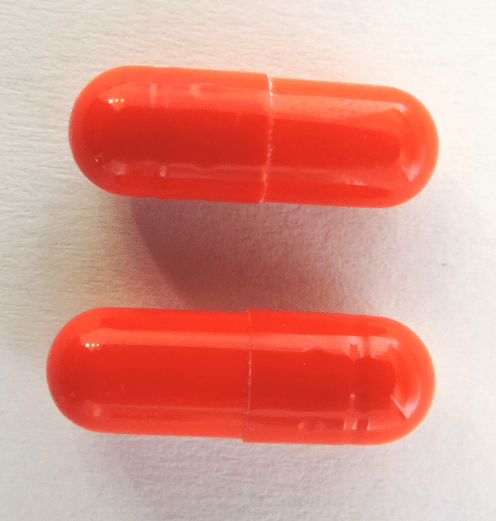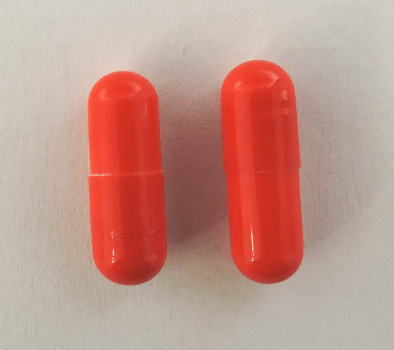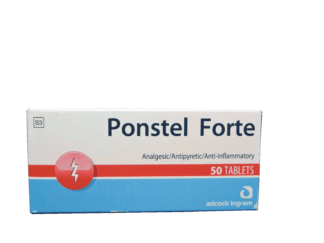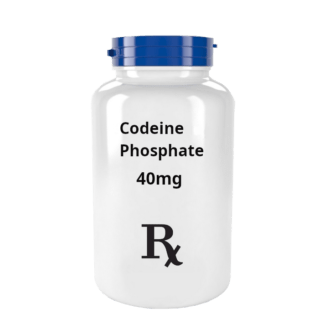Description
Codeine Phosphate 40mg is a prescription medicine used to treat the symptoms of mild to moderately severe pain. Codeine Phosphate belongs to a class of drugs called Analgesics, Opioids.
Codeine Phosphate may be used alone or with other medications.
WARNING – MAY BE HABIT FORMING
Before taking this Codeine Phosphate 40mg
You should not use this medicine if you are allergic to it, or if you have:
- severe asthma or breathing problems;
- a blockage in your stomach or intestines; or
- frequent asthma attacks or hyperventilation.
In some people, codeine breaks down rapidly in the liver and reaches higher than normal levels in the body. This can cause dangerously slow breathing and may cause death, especially in a child.
Do not give codeine to anyone younger than 18 years old.
Dependence
Although much less potent in this regard than morphine, codeine can produce drug dependence a.d. therefore, has the potential for being abused. Patients given 60 mg codeine every 6 hours for 2 months usually show some tolerance and mild withdrawal symptoms. Development of the dependent state is recognized by an increased tolerance to the analgesic effect and the appearance of purposive phenomena (complaints, pleas, demands, or manipulative actions) shortly before the time of the next scheduled dose. A patient in withdrawal should be treated in a hospital environment. Usually, it is necessary only to provide supportive care with administration of a tranquilizer to suppress anxiety. Severe symptoms of withdrawal may require administration of a replacement narcotic.
What Are Side Effects of Codeine Phosphate 40mg?
Common side effects of codeine phosphate include:
- drowsiness,
- lightheadedness,
- dizziness,
- sedation,
- shortness of breath,
- nausea,
- vomiting,
- stomach pain,
- sweating,
- constipation,
- itching, or
- rash.
How does Codeine Phosphate interact with the body?
Codeine acts on your brain and nervous system to lessen the way you feel pain. Codeine works by weakly binding to a specific opioid receptor, known as the mu-opioid receptor, but with much less affinity than morphine, which means its pain-relieving effects are not as strong as morphine’s.
What is Codeine Phosphate actually used for?
Codeine is an oral prescription opioid (narcotic) drug most commonly used to treat mild-to-moderate pain, as a cough suppressant, and to help relieve pain from tension headaches. It is often combined with other medications for these or other uses and can be habit-forming.
How many hours apart should I take codeine?
You should take codeine tablets at least FOUR hours apart. Do not take them any more frequently than every four hours.
PRECAUTIONS
 ALCOHOL
ALCOHOL
Do not drink alcohol. Dangerous side effects or death could occur.
 PREGNANCY
PREGNANCY
Consult Your Doctor
On the basis of the historical use of codeine phosphate during all stages of pregnancy, there is no known risk of fetal abnormality. Codeine phosphate should be given to a pregnant woman only if clearly needed.
 BREAST FEEDING
BREAST FEEDING
CAUTION
Codeine appears in the milk of nursing mothers. Caution should be exercised when it is administered to a nursing woman.
 DRIVING
DRIVING
CAUTION
Codeine may impair the mental and/or physical abilities required for the performance of potentially hazardous tasks such as driving a car or operating machinery. Effects such as confusion, drowsiness, dizziness, hallucinations, blurred or double vision or convulsions may occur. The effects of alcohol are enhanced with this combination. Do not drive or operate machinery if affected.







